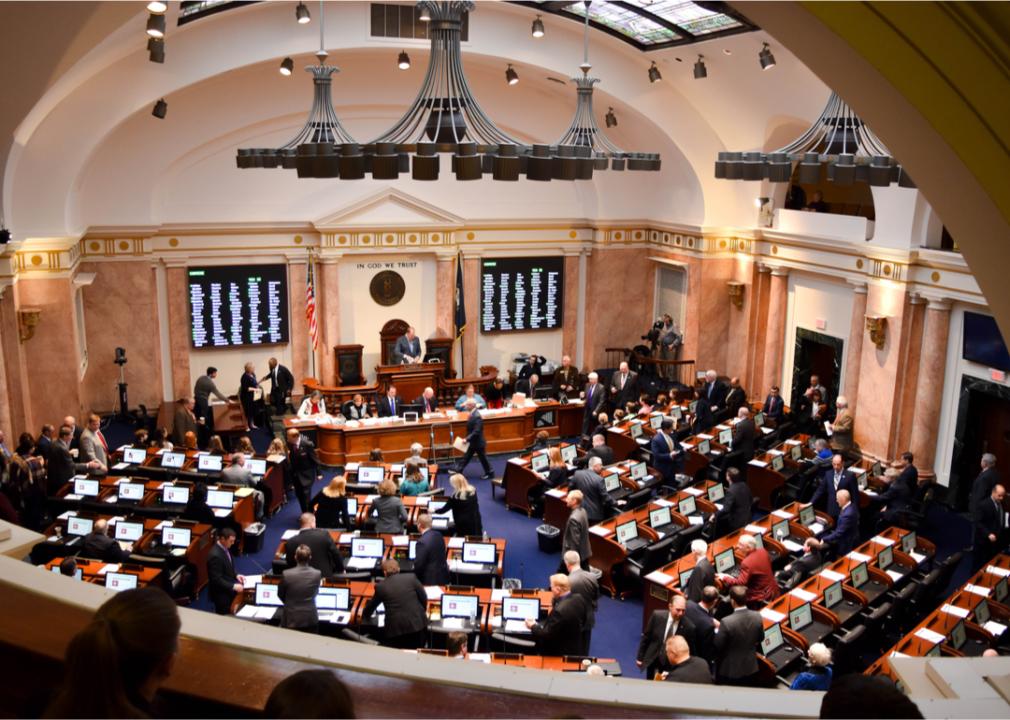Lawmakers share early thoughts on education
Published 4:10 pm Tuesday, November 28, 2023
The legislative session is starting in a little over a month, and state senators representing Warren County are already thinking about what’s in store.
Heading into a budget year, Kentucky has a record $1.4 billion surplus and a rainy day fund approaching $3.7 billion.
Warren County state senators said that education is one of their top priorities.
How does the budget process work?
In a budget year, the House presents its budget first.
The governor typically submits his budget proposals before the House, and legislators can choose whether to include his recommendations in their budget bill.
After passing their budget, the House sends it to the Senate, which will make its own recommendations before sending it back.
There are often disagreements, so a conference committee including the leaders of the House and Senate convenes to iron out the differences.
The final budget bill is then passed in both chambers before being sent to the governor, who will decide which parts to veto. After the veto period, the House and Senate will reconvene to override any vetoes they disagree with.
Chronic Absenteeism
Sen. Mike Wilson, R-Bowling Green, said that at least half of each year’s budget goes toward education.
This year, he expects the legislature to look at the SEEK formula, which determines the state funding that goes to each school district.
It is based on attendance, but Kentucky is experiencing a chronic absenteeism problem.
Sen. David Givens, R-Greensburg, said that one in three students are missing a day of school every two weeks, causing significant learning loss.
“We also are creating models of bad future behavior in the workforce,” Givens said. “If a young person thinks the way that he or she gets through the process is by missing a day of work every two weeks, we’re setting ourselves up for some future challenges.”
He said that the conversation will revolve around how to encourage districts, parents and families to get students back in class.
Teacher Raises
Teacher raises were a major topic on the campaign trail.
Gov. Andy Beshear included an 11% across the board raise for school employees in his education budget proposal, which would cost about $1.1 billion.
Sen. Max Wise, R-Campbellsville, said that he isn’t sure if an across the board raise is in the works, but he likes what they’ve done in the past – giving school boards the freedom to use state funding as they please, whether on raises or something else, since they are the ones who hire teachers into the local school districts.
Givens said that he and many of his colleagues think it’s inappropriate for the state to set the pay scale.
Last budget cycle, Wilson said that about 90% of districts used historic funding to give teachers raises.
School Choice
Kentucky is one of 10 states that doesn’t have any form of school choice legislation.
The Kentucky constitution currently prohibits the state from providing funding to non-public schools.
There have been talks about adding a constitutional amendment to the ballot in 2024 to let Kentucky voters decide whether to change that.
If they did, it would make room for school choice measures that would allow state funds to go to private schools.
Givens said he expects the legislature to talk about it, but doesn’t have specifics.
“As long as we focus taxpayer funds on student success, whether it’s in a publicly funded opportunity to move students forward or a novel approach that may be able to target needs better than what some public systems can, I think you’re gonna see us focus on student success,” he said.
Passing a bill to get school choice on the ballot would require 23 out of 38 votes in the Senate and 60 out of 100 in the House.
Wise said that it comes down to whether they can get that majority support.
“I don’t know what that actually looks like in terms of school choice,” Wise said. “I mean, are we talking about scholarship tax credits, are we talking about full blown school choice that opens up vouchers and things like that? I don’t yet know what that is and so it’s too premature for me to say right now.”
Teacher shortage
Wise said that he is hopeful that the legislature can do something with the budget to alleviate the teacher shortage, whether that’s raises or better training opportunities for teachers.
He said that Kentucky needs to market the profession better, encouraging kids to enter the pipeline through grow your own programs.
Givens said that a few good ideas came up during the interim education sessions.
They include paying student teachers as they work through the curriculum and offering loan forgiveness programs as incentives, particularly for districts struggling to attract and recruit teachers in specific fields.


